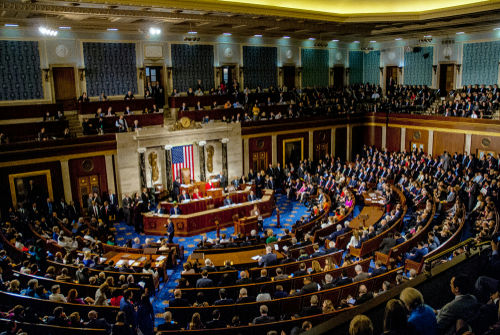Democrats have been accused of “hostage taking” as Congress faces a government shutdown, intensifying the fight over federal spending, healthcare, and tax credits.
Partisan Deadlock Threatens Government Services
Congressional divisions have reached a breaking point as a continuing resolution to fund the federal government failed in both chambers. On September 19, 2025, the House passed a Republican-sponsored bill, H.R.5371, to keep the government open through November, but the Senate rejected it. A Democrat-sponsored bill, S.2882, also failed in the Senate. The inability to compromise now threatens critical government operations and public services, with the White House warning that a shutdown is imminent.
Republican leaders argue Democrats are holding vital funding “hostage” to push through permanent extensions to tax credits and changes to healthcare law. This rhetoric has heightened partisan tensions, with each side blaming the other for refusing to negotiate. The underlying dispute involves Medicaid cuts, enhanced premium tax credits, and the timing of key healthcare provisions, issues that have repeatedly divided Congress during past shutdowns.
Key Players Shape the Negotiations
The current standoff features narrow majorities in both the House and Senate, amplifying the stakes of each vote. Republican leadership, backed by President Trump, seeks to maintain current funding levels and delay controversial Medicaid cuts. Democratic leadership is pressing for expanded healthcare access and continued tax relief for working families. The Congressional Budget Office provides nonpartisan analysis, while federal agencies and employees brace for the effects of a potential shutdown.
President Trump’s administration has taken an active role in shaping negotiations, signaling a firm stance against what it views as fiscal mismanagement and government overreach by past administrations. The White House’s prediction of a shutdown reflects the administration’s commitment to conservative fiscal principles and resistance to left-leaning social policies.
Consequences for Americans
If no agreement is reached by midnight, federal employees will face furloughs and agencies will close, disrupting services relied upon by millions of Americans. The healthcare sector is especially vulnerable, with delays in Medicaid and hospital payments threatening care for patients. Businesses dependent on federal contracts may see operations grind to a halt, while veterans and other recipients of government support risk interruptions to their benefits.
Short-term consequences include immediate service disruptions and economic losses. Long-term risks involve a decline in public trust, uncertainty for families and communities, and delayed implementation of important policies. The political fallout could influence the 2026 midterm elections, as both parties seek to blame the other for the gridlock.
Top Republican Accuses Dems of ‘Hostage Taking’ to Force Govt Shutdownhttps://t.co/2bo0YUW6ir
— Mediaite (@Mediaite) September 29, 2025
Policy experts and analysts warn that repeated threats of shutdown undermine government effectiveness and erode confidence in elected leaders. Healthcare professionals emphasize the dangers to hospitals and vulnerable patients if funding gaps persist. Political scientists point out that the “hostage taking” rhetoric reflects growing polarization and strategic brinkmanship in Washington, with both parties contributing to the impasse.
Sources:
Government Shutdown Advisory – Holland & Knight
Sides Remain Divided; White House Predicts Shutdown Will Occur – GovExec
US Government Shutdown 2025: General Information and Resources – SRCD

